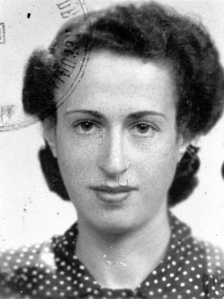As the Nazis approached, the French interned most foreign nationals. Lisa was sent to a poorly-organized camp in Gurs with thousands of other women. As chaos increased, however, she managed to escape with a friend and made her way to Marseilles in the spring of 1940. She met up with Hans and they stayed in the village of Banyuls-sur-Mer at the edge of the Pyrenees.
Independent and resourceful, Lisa looked toward Spain for an escape route. The mayor of the town provided her with a tiny hand-drawn map of a route over the mountains known to smugglers.
The first group of people Lisa led over the route included the writer Walter Benjamin. “Benjamin was the European mind writ large, exactly what the Nazis wanted to obliterate,” suggests Jay Parini in his book Benjamin’s Crossing [1997]. “I lost my way repeatedly,” Lisa said. “When you are up there, all you see is mountains.” This trip took ten hours, but as she grew used to it, Lisa could do the route in three or four hours. She was 31.
Walter Benjamin made the perilous journey with Lisa’s help, but committed suicide on his first evening in Spain, due to his ill-health and fear of being repatriated.
Working with the American Rescue Committee set up by Varian Fry, the Fittkos stayed on for more than six months. Every few days they led a group of refugees posing as vineyard workers over the mountains on the route Lisa found. No one was captured on these trips. Though they didn’t count, it is thought that the Fittkos were instrumental in the escape of 1,500 people. When the Vichy government took over, it became too dangerous. The couple took a ship to Cuba in November 1941.
In Cuba Lise worked as a secretary in an import-export business and Hans became a diamond cutter. After the war they would have liked to return to Germany, but as socialists, they were not allowed. Lisa and many of her family met up in Chicago. Hans died in 1960, but Lisa continued to be politically active. Living in Hyde Park, she was a peace activist and continued to speak out for racial and economic justice. The Obamas attended her 90th birthday party. She lived until age 95.
Lisa Fittko was surprised to find that what she had done as a young woman had historic value. She wrote and published two books about her war-time activities: Escape through the Pyrenees [1991] and Solidarity and Treason: Resistance and Exile [1993]. I did not know about Fittko until I read Jay Parini’s fictional depiction of her. I also found an interview with her from the 1990’s in which she is thoughtful and articulate about many of the details of this time period. History takes time to unfold. We are still learning from 20th century chaos in Europe.


No comments:
Post a Comment